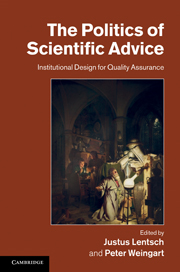15 results
1 - Introduction: the quest for quality as a challenge to scientific policy advice: an overdue debate?
-
-
- Book:
- The Politics of Scientific Advice
- Published online:
- 25 October 2011
- Print publication:
- 02 June 2011, pp 3-18
-
- Chapter
- Export citation
Part I - Methodological issues: quality control and assurance in scientific policy advice
-
- Book:
- The Politics of Scientific Advice
- Published online:
- 25 October 2011
- Print publication:
- 02 June 2011, pp 1-2
-
- Chapter
- Export citation
Contents
-
- Book:
- The Politics of Scientific Advice
- Published online:
- 25 October 2011
- Print publication:
- 02 June 2011, pp v-vii
-
- Chapter
- Export citation
List of figures
-
- Book:
- The Politics of Scientific Advice
- Published online:
- 25 October 2011
- Print publication:
- 02 June 2011, pp viii-viii
-
- Chapter
- Export citation
List of tables
-
- Book:
- The Politics of Scientific Advice
- Published online:
- 25 October 2011
- Print publication:
- 02 June 2011, pp ix-ix
-
- Chapter
- Export citation
Part V - Academies of science
-
- Book:
- The Politics of Scientific Advice
- Published online:
- 25 October 2011
- Print publication:
- 02 June 2011, pp 295-296
-
- Chapter
- Export citation
Frontmatter
-
- Book:
- The Politics of Scientific Advice
- Published online:
- 25 October 2011
- Print publication:
- 02 June 2011, pp i-iv
-
- Chapter
- Export citation

The Politics of Scientific Advice
- Institutional Design for Quality Assurance
-
- Published online:
- 25 October 2011
- Print publication:
- 02 June 2011
Acknowledgements
-
- Book:
- The Politics of Scientific Advice
- Published online:
- 25 October 2011
- Print publication:
- 02 June 2011, pp x-x
-
- Chapter
- Export citation
Part II - Collegial science advisory bodies
-
- Book:
- The Politics of Scientific Advice
- Published online:
- 25 October 2011
- Print publication:
- 02 June 2011, pp 71-72
-
- Chapter
- Export citation
Part IV - Research-based advisory organisations
-
- Book:
- The Politics of Scientific Advice
- Published online:
- 25 October 2011
- Print publication:
- 02 June 2011, pp 175-176
-
- Chapter
- Export citation
Index
-
- Book:
- The Politics of Scientific Advice
- Published online:
- 25 October 2011
- Print publication:
- 02 June 2011, pp 375-381
-
- Chapter
- Export citation
20 - Quality control in the advisory process: towards an institutional design for robust science advice
-
-
- Book:
- The Politics of Scientific Advice
- Published online:
- 25 October 2011
- Print publication:
- 02 June 2011, pp 353-374
-
- Chapter
- Export citation
Part III - Collegial science policy advisory bodies
-
- Book:
- The Politics of Scientific Advice
- Published online:
- 25 October 2011
- Print publication:
- 02 June 2011, pp 137-138
-
- Chapter
- Export citation
Biographical notes
-
- Book:
- The Politics of Scientific Advice
- Published online:
- 25 October 2011
- Print publication:
- 02 June 2011, pp xi-xx
-
- Chapter
- Export citation

